外研版(2019)必修第二册Unit 1 Food for thought Using language 语法课件(共14张PPT)
文档属性
| 名称 | 外研版(2019)必修第二册Unit 1 Food for thought Using language 语法课件(共14张PPT) | 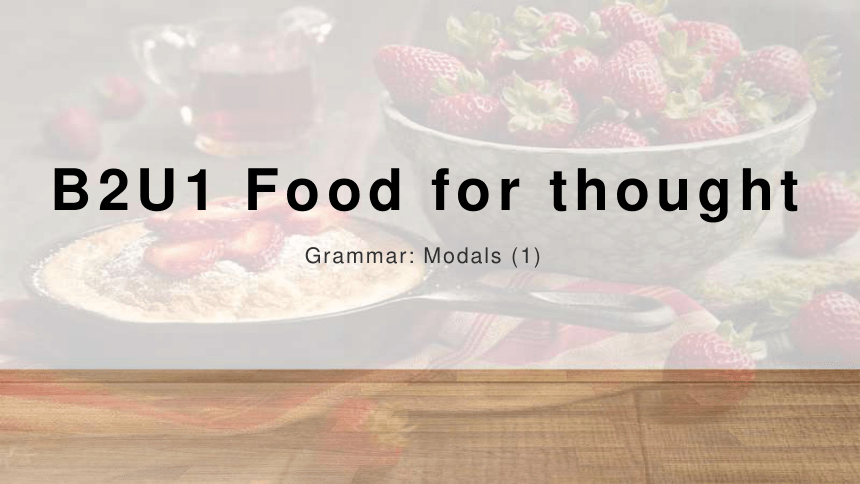 | |
| 格式 | pptx | ||
| 文件大小 | 5.6MB | ||
| 资源类型 | 教案 | ||
| 版本资源 | 外研版(2019) | ||
| 科目 | 英语 | ||
| 更新时间 | 2024-02-27 16:53:36 | ||
图片预览



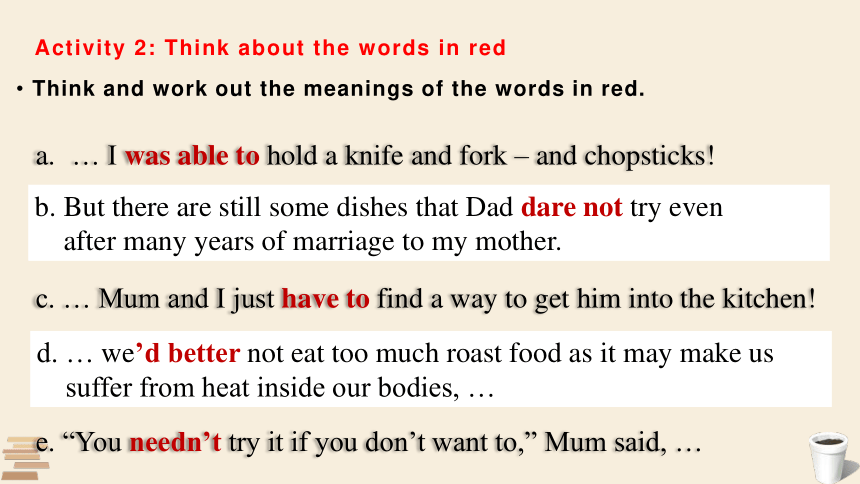
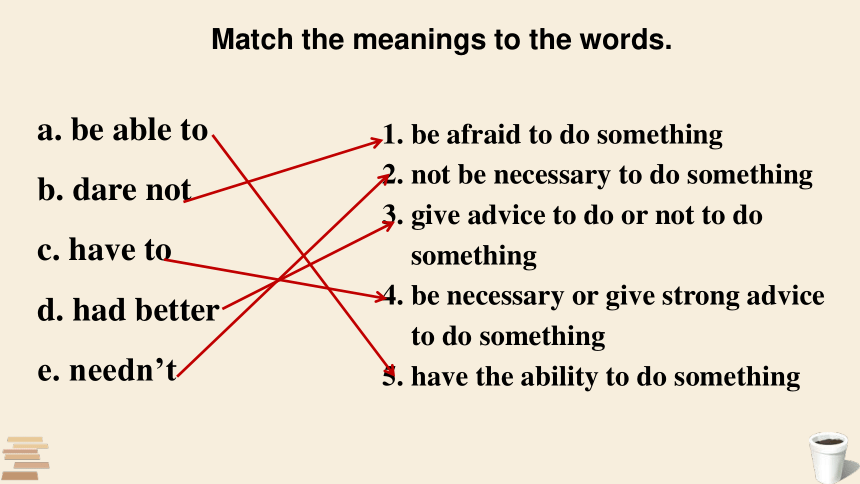
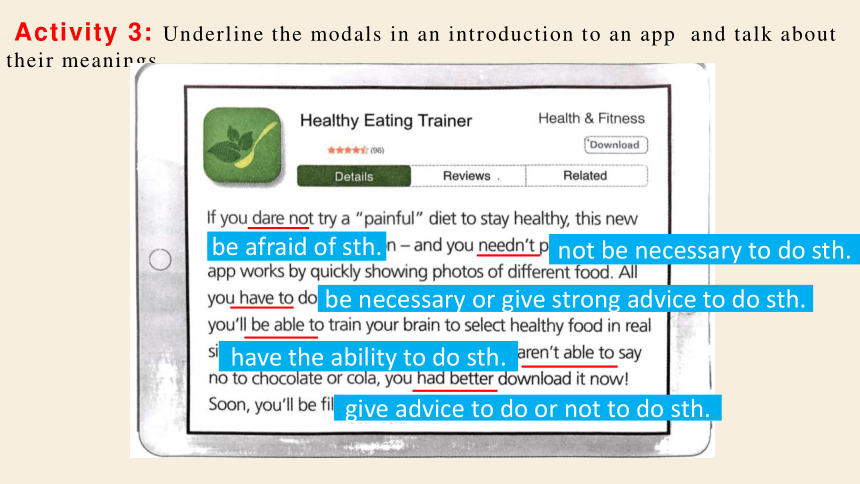
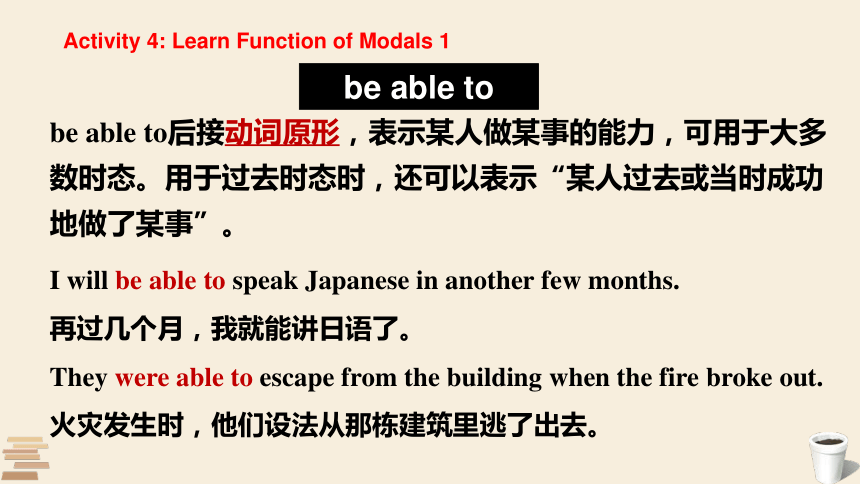
文档简介
(共14张PPT)
Grammar: Modals (1)
B2U1 Food for thought
Activity 1: Revision
What type of verb is the one in bold in each of the following sentences
Yuan Longping worked all his life on the research of hybrid rice.
Yuan Longping will live in the hearts of the Chinese people forever.
Yuan Longping is the pride of the Chinese people.
We can never praise Yuang Longping’s contributions too much.
动词分类:
行为动词:run, jump, make
系动词:is, taste, sound...
助动词:be, have
情态动词:can, may
情态动词(Modals)本身具有一定的词义,不能独立作谓语,必须和动词原形一起构成谓语。情态动词虽然数量不多,但用途广泛。
常用的情态动词包括can (could), may (might), will (would), shall (should), must, need, dare, had better, ought to, used to等。
Revision
What modals have you learn
can could
may might
will would
must
Activity 2: Think about the words in red
Think and work out the meanings of the words in red.
… I was able to hold a knife and fork – and chopsticks!
c. … Mum and I just have to find a way to get him into the kitchen!
e. “You needn’t try it if you don’t want to,” Mum said, …
b. But there are still some dishes that Dad dare not try even
after many years of marriage to my mother.
d. … we’d better not eat too much roast food as it may make us
suffer from heat inside our bodies, …
Match the meanings to the words.
a. be able to
b. dare not
c. have to
d. had better
e. needn’t
1. be afraid to do something
2. not be necessary to do something
3. give advice to do or not to do
something
4. be necessary or give strong advice
to do something
5. have the ability to do something
Activity 3: Underline the modals in an introduction to an app and talk about their meanings.
have the ability to do sth.
be afraid of sth.
be necessary or give strong advice to do sth.
not be necessary to do sth.
give advice to do or not to do sth.
Activity 4: Learn Function of Modals 1
be able to
be able to后接动词原形,表示某人做某事的能力,可用于大多数时态。用于过去时态时,还可以表示“某人过去或当时成功地做了某事”。
I will be able to speak Japanese in another few months.
再过几个月,我就能讲日语了。
They were able to escape from the building when the fire broke out.
火灾发生时,他们设法从那栋建筑里逃了出去。
dare & need
How dare you say I’m unfair 你怎么敢说我不公平?
You needn’t come so early. 你不用这么早来。
I dare to swim across this river. 我敢游过河去。
He does not dare (to) answer. 他不敢回答。
have to
have to 的含义与 must 相似,两者往往可以互换使用,但 have to 有各种时态,且强调客观需要,意为“不得不”。
I have to leave because of the bad weather.
因为天气不好,我不得不离开了。
had better
had better后接动词原形,意为“最好”,用于现在时或将来时,可用于一切人称,没有任何词形变化。had better 的否定式是在其后加 not,疑问式是把 had 和 not 提前。
You’d better sit here and have a rest. 你最好坐在这儿休息一下。
She had better not tell lies any more. 她最好再也别撒谎了。
Hadn’t the doctor better see him 医生是不是去看看他比较好?
Activity 5: Practice
Complete the tips for good table manners with the correct form of the modals you learned today.
While going on your first trip to the UK is exciting, new and different customs can also be confusing. Table manners are no exception. But don’t worry — here are some tips:
You 1. _____________ wait until everyone else has been served
before you start eating.
have to
Sometimes there are so many knives and forks that you
2. _____________ pick them up in case you get it wrong. The
trick is to start with the ones on the outside.
When you finish your meal, you 3. ____________ place the knife
and fork together on your plate with the handles at the four
o’clock position.
dare not
had better
Table manners, however, can differ in different situations. For example, you 4. __________ use a knife and fork when eating a hamburger or pizza. Just remember: when in Rome, do as the Romans do, and you will 5. ___________ enjoy the local cuisine!
needn’t
be able to
Homework
你的美国朋友Peter在中国留学,这周末被邀请去一位中国同学家里做客。他写信向你咨询中国的餐桌礼仪。请根据视频内容给Peter回一封信。
Grammar: Modals (1)
B2U1 Food for thought
Activity 1: Revision
What type of verb is the one in bold in each of the following sentences
Yuan Longping worked all his life on the research of hybrid rice.
Yuan Longping will live in the hearts of the Chinese people forever.
Yuan Longping is the pride of the Chinese people.
We can never praise Yuang Longping’s contributions too much.
动词分类:
行为动词:run, jump, make
系动词:is, taste, sound...
助动词:be, have
情态动词:can, may
情态动词(Modals)本身具有一定的词义,不能独立作谓语,必须和动词原形一起构成谓语。情态动词虽然数量不多,但用途广泛。
常用的情态动词包括can (could), may (might), will (would), shall (should), must, need, dare, had better, ought to, used to等。
Revision
What modals have you learn
can could
may might
will would
must
Activity 2: Think about the words in red
Think and work out the meanings of the words in red.
… I was able to hold a knife and fork – and chopsticks!
c. … Mum and I just have to find a way to get him into the kitchen!
e. “You needn’t try it if you don’t want to,” Mum said, …
b. But there are still some dishes that Dad dare not try even
after many years of marriage to my mother.
d. … we’d better not eat too much roast food as it may make us
suffer from heat inside our bodies, …
Match the meanings to the words.
a. be able to
b. dare not
c. have to
d. had better
e. needn’t
1. be afraid to do something
2. not be necessary to do something
3. give advice to do or not to do
something
4. be necessary or give strong advice
to do something
5. have the ability to do something
Activity 3: Underline the modals in an introduction to an app and talk about their meanings.
have the ability to do sth.
be afraid of sth.
be necessary or give strong advice to do sth.
not be necessary to do sth.
give advice to do or not to do sth.
Activity 4: Learn Function of Modals 1
be able to
be able to后接动词原形,表示某人做某事的能力,可用于大多数时态。用于过去时态时,还可以表示“某人过去或当时成功地做了某事”。
I will be able to speak Japanese in another few months.
再过几个月,我就能讲日语了。
They were able to escape from the building when the fire broke out.
火灾发生时,他们设法从那栋建筑里逃了出去。
dare & need
How dare you say I’m unfair 你怎么敢说我不公平?
You needn’t come so early. 你不用这么早来。
I dare to swim across this river. 我敢游过河去。
He does not dare (to) answer. 他不敢回答。
have to
have to 的含义与 must 相似,两者往往可以互换使用,但 have to 有各种时态,且强调客观需要,意为“不得不”。
I have to leave because of the bad weather.
因为天气不好,我不得不离开了。
had better
had better后接动词原形,意为“最好”,用于现在时或将来时,可用于一切人称,没有任何词形变化。had better 的否定式是在其后加 not,疑问式是把 had 和 not 提前。
You’d better sit here and have a rest. 你最好坐在这儿休息一下。
She had better not tell lies any more. 她最好再也别撒谎了。
Hadn’t the doctor better see him 医生是不是去看看他比较好?
Activity 5: Practice
Complete the tips for good table manners with the correct form of the modals you learned today.
While going on your first trip to the UK is exciting, new and different customs can also be confusing. Table manners are no exception. But don’t worry — here are some tips:
You 1. _____________ wait until everyone else has been served
before you start eating.
have to
Sometimes there are so many knives and forks that you
2. _____________ pick them up in case you get it wrong. The
trick is to start with the ones on the outside.
When you finish your meal, you 3. ____________ place the knife
and fork together on your plate with the handles at the four
o’clock position.
dare not
had better
Table manners, however, can differ in different situations. For example, you 4. __________ use a knife and fork when eating a hamburger or pizza. Just remember: when in Rome, do as the Romans do, and you will 5. ___________ enjoy the local cuisine!
needn’t
be able to
Homework
你的美国朋友Peter在中国留学,这周末被邀请去一位中国同学家里做客。他写信向你咨询中国的餐桌礼仪。请根据视频内容给Peter回一封信。
